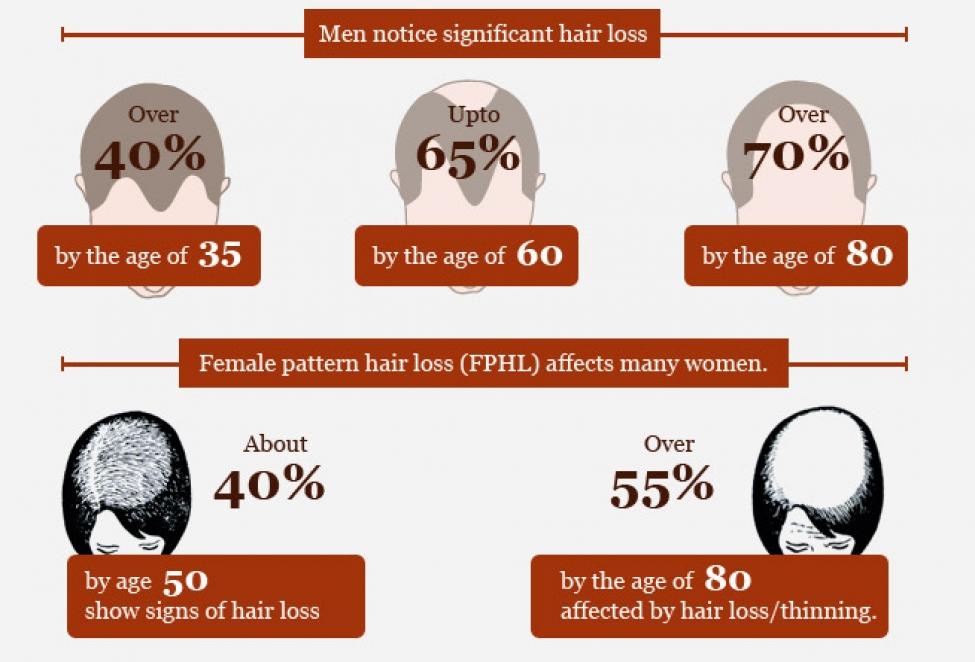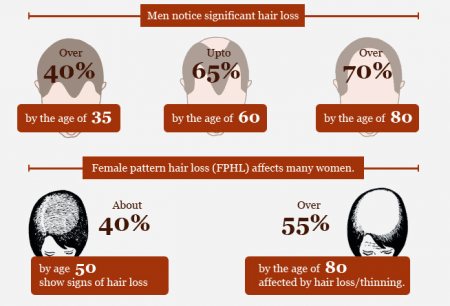Hair loss
Many conditions and diseases can result in hair loss, as can improper hair care.
The most common cause of hair loss is hereditary thinning or baldnessaldo known as androgenic alopecia or pattern baldness.
While daily shedding is normal, people who notice their hair shedding in large amounts after combing or brushing and those whose hair becomes thinner or falls out should consult with a hair loss specialist for proper diagnosis and treatment.
Causes of hair loss
Causes of hair loss, some of which are temporary, include:
- Excessive or improper use of styling products such as perms, dyes, gels, relaxers or sprays, which can cause weathering or hair breakage.
Hairstyles that pull on the hair, like ponytails and braids. - Shampooing, combing or brushing hair too much or too hard, or pulling it out.
- A variety of diseases, including thyroid disease.
- Childbirth, major surgery, a high fever or severe infection, stress, or even the flu.
- Inadequate protein or iron in the diet, or eating disorders such as anorexia and bulimia.
- Certain prescription drugs, including blood thinners, high-dose vitamin A, and medicines for arthritis, depression, gout, heart problems and high blood pressure.
- Use of birth control pills (usually in women with an inherited tendency for hair thinning).
- Hormonal imbalances, especially in women.
- Ringworm of the scalp, a contagious fungal infection most common in children.
- Some cancer treatments, such as radiation therapy and chemotherapy.
- Alopecia Areata, a type of hair loss that affects all ages, which causes hair to fall out in round patches.
Psychosocial impact of hair loss
While the physical symptoms of hair loss can be traumatic, the psychosocial impact of hair loss can be just as severe.
Hair loss can cause dramatic and devastating emotions that can negatively impact your quality of life. Studies on the psychosocial impact of hair loss have found self-esteem, body image and self-confidence to be negatively affected.
Known psychosocial complications include depression, low self-esteem, altered self-image, and less frequent and enjoyable social engagement.
The negative quality of life may be worse in women due to societal pressure to be attractive. Treatment from a hair loss specialist may be sought in order to improve ones quality of life.
Treatment of hair loss
Topical minoxidil (for men and women; available over-the-counter) and oral finasteride (for men only; prescription only) have been shown to help the regrowth of hair or to slow hair loss. Low level laser therapy is also an effective treatment and hair replacement solutions are an effective and undetectable way to replace your hair once it has fallen out.
Hair loss caused by diseases such as thyroid disease may be reversed with treatment of the underlying disease.
Topical or injectable cortisone medications have been shown to accelerate the regrowth of hair in some types of hair loss. Topical or oral estrogen or other female-specific hormones are sometimes prescribed for women experiencing hair loss.
Hair transplantation is a permanent form of hair replacement utilizing dermatologic surgery that involves moving some existing scalp hair to bald or thinning parts. It may benefit men with male pattern baldness, some women with thinning hair, and people who have lost some but not all hair from burns or other scarring injuries to the scalp, eyebrows or eyelashes.
There are a variety of solutions and treatments to address thinning hair and hair loss. To learn more about which is right for you, call us today at (732) 282-0020.
SHARE THIS ARTICLE:










